
Aleksey Feofilaktovich Pisemsky was a Russian novelist and dramatist who was regarded as an equal of Ivan Turgenev and Fyodor Dostoyevsky in the late 1850s, but whose reputation suffered a spectacular decline after his fall-out with Sovremennik magazine in the early 1860s. A realistic playwright, along with Aleksandr Ostrovsky he was responsible for the first dramatization of ordinary people in the history of Russian theatre. "Pisemsky's great narrative gift and exceptionally strong grip on reality make him one of the best Russian novelists," according to D.S. Mirsky.

Pavel Ivanovich Melnikov was a Russian writer, best known for his novels In the Forests and On the Hills, which describe the unique life of Transvolga and use its dialects.
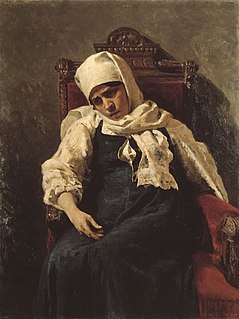
A Bitter Fate, also translated as A Bitter Lot, is an 1859 realistic play by Aleksey Pisemsky.
The Simpleton is the debut novel by Alexei Pisemsky, written in the late 1840 and first published in October and November 1850 by Moskvityanin. The novel has met critical acclaim and made Pisemsky a popular author.
Boyarshchina is an early novel by Aleksey Pisemsky. Written in 1844-1846 under the original title Is She to Blame?, it was published only in 1858 in Biblioteka Dlya Chteniya magazine.
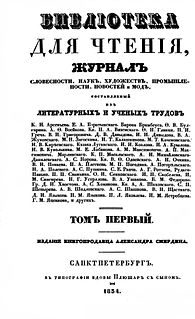
Biblioteka Dlya Chteniya was a Russian monthly magazine founded in Saint Petersburg, Russian Empire, in 1834 by Alexander Smirdin.
Grazhdanin was a Russian conservative political and literary magazine published in Petersburg in 1872–1914. The magazine was founded by Prince Vladimir Meshchersky. It came out weekly or two times a week, and daily in 1887–1914. Grazhdanin exerted some influence on policies of the Russian government. It adhered to principals of monarchism and opposed liberal press and revolutionary movements. Fyodor Dostoyevsky was the magazine’s chief editor from the early 1873 to April 1874. Throughout this magazine’s existence, people like Konstantin Pobedonostsev, Nikolay Strakhov, Aleksey Pisemsky, Nikolai Leskov, Fyodor Tyutchev, Apollon Maykov, Yakov Polonsky, Aleksey Apukhtin, Vasily Nemirovich-Danchenko and others published their works on its pages.
Anti-nihilistic novel was a genre in Russian literature in the second half of the 19th century, as a reaction to the disillusionment in the Russian revolutionary movement of the time. The term derives from the usage of the word "nihilist" in the general sense of "(political) radical" in the Russian Empire of the time, derived from the radical Russian Nihilist movement.
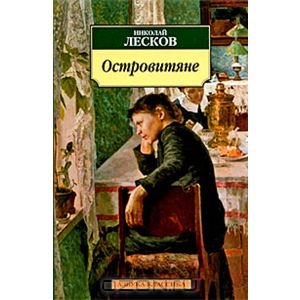
The Islanders is a novel by Nikolai Leskov, first published in November–December 1866 issues of Otechestvennye Zapiski, under the moniker M.Stebnitsky. In 1867 the novel came out as a separate edition in Saint Petersburg.
Masons is a novel by Alexey Pisemsky started in the late 1878 and first published in 1880 in Ogonyok magazine. Pisemsky who regarded the Freemasonry as a progressive force in Russia of the 1820s and 1830s based the narrative upon his personal childhood memories of the people he knew who belonged to the lodge.
Zarya was a monthly literary and political Russian magazine published in Saint Petersburg in 1869-1872.

Vasily Vasilyevich Samoylov was a Russian stage actor, associated with Alexandrinsky Theatre in Saint Petersburg. Initially an opera singer, he was also an artist whose several albums of paintings include the gallery of stage self-portraits, amounting to a visual autobiography.

Varfolomey Alexandrovich Zaytsev was a Russian journalist, essayist, publicist, translator and literary critic, one of the leaders of the nihilist flank of the Russian literary left of the time.
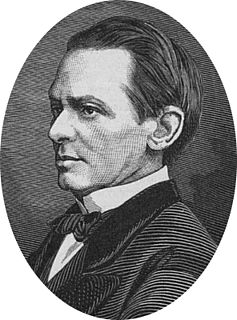
Pyotr Ivanovich Zubrov was a Russian stage actor, associated with the Alexandrinsky Theatre.
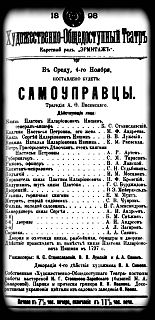
Men Above the Law is a tragedy in five acts by Alexey Pisemsky first published in the No.2, February 1867 issue of Vsemirny Trud magazine.
The Philistines is a three-part novel by Alexey Pisemsky started in 1873 and finished, according to the author's autograph, on 24 October 1877. Originally serialized by Mikhail Mikeshin-edited Ptchela (Bee) magazine, in Nos. 18-49, 1877, it came out as a separate edition in 1878, published again by Mikeshin. The novel is considered to be thematically akin to the plays by Pisemsky which satirized the emerging Russian capitalism. Describing the novel's hero Begushev, a 'fearless knight' facing on his own the world of greed and crime, Pisemsky wrote: "...In his portrait please try to conjoin the features of [Mikhail] Bestuzhev and Hertzen, for it's their faces that I'd had in my imagination".
Beseda was a Russian literary and political magazine founded in Saint Petersburg, Russian Empire, in 1871 by Alexander Koshelev and edited by Sergey Yuriev. The former's idea was follow the blueprint provided by his previous project, Russkaya Beseda, but Yuriev from the start started to build up a diverse team of contributors, while still being loyal to the original Panslavic doctrine.

The Comic Actor is an 1851 novella by Aleksey Pisemsky. It first appeared in print in the November 1851 issue of Moskvityanin and was later included into the 1861 edition of Works by A.F. Pisemsky, published in St. Petersburg by Fyodor Stellovsky.

An Old Man's Sin is an 1861 novella by Aleksey Pisemsky. It first appeared in Biblioteka Dlya Chteniya's January 1861 issue, dated as "23 November 1860, Petersburg" and later that year was included into the Works by A.F. Pisemsky, compiled and published by Fyodor Stellovsky.











